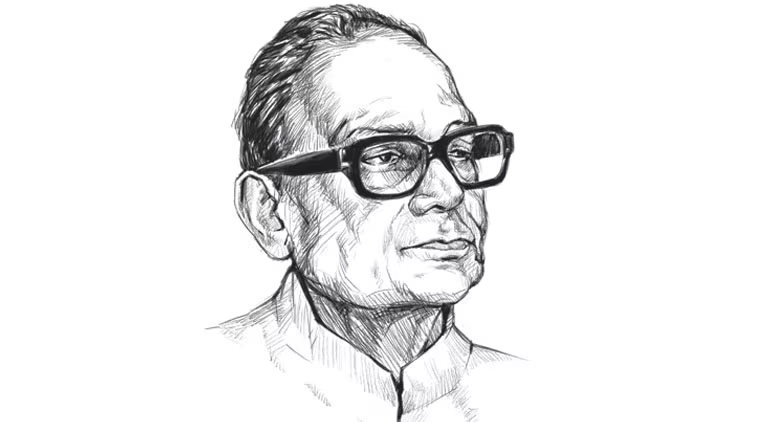Jayaprakash Narayan, often referred to as JP or Lok Nayak, was one of India’s most influential political leaders and social reformers. His contributions to the Indian freedom struggle, his role in post-independence politics, and his leadership during the JP Movement and Emergency have left an indelible mark on Indian history. This article delves into the life, education, contributions, and legacy of Jayaprakash Narayan, exploring his role as a freedom fighter, the organizations he founded, his family, and why he is revered as Lok Nayak.

Jayaprakash Narayan Early Life and Background
Jayaprakash Narayan was born on October 11, 1902, in the village of Sitabdiara in the Saran district of Bihar. His father, Harsu Dayal Srivastava, was a junior official in the Canal Department of the State Government, and his mother, Phul Rani Devi, was a devout woman who instilled in him the values of honesty and integrity. Jayaprakash Narayan belonged to the state of Bihar, which played a significant role in shaping his political and social outlook.
Jayaprakash Narayan Education
Jayaprakash Narayan’s education began in his village school, but his quest for knowledge took him to Patna, where he enrolled in the prestigious Patna Collegiate School. He excelled in his studies and later joined the Patna College, where he developed a keen interest in politics and social issues. His academic journey took him to the United States, where he studied at the University of California, Berkeley, and the University of Wisconsin. It was during his time in the U.S. that he was exposed to the ideas of Marxism, socialism, and the labor movement, which would later influence his political ideology.
Jai Prakash Narayan Freedom Fighter
Jayaprakash Narayan’s return to India in 1929 marked the beginning of his active involvement in the Indian freedom struggle. He joined the Indian National Congress and quickly rose through the ranks due to his dedication and leadership skills. He was deeply influenced by Mahatma Gandhi’s philosophy of non-violence and civil disobedience, and he played a crucial role in organizing protests, strikes, and movements against British rule.
During the Quit India Movement of 1942, Jayaprakash Narayan emerged as one of the most prominent leaders. He went underground and organized a guerrilla movement against the British, earning him the reputation of a fearless freedom fighter. His efforts to mobilize the masses and his unwavering commitment to the cause of independence made him a key figure in the struggle for India’s freedom.
Jayaprakash Narayan Organizations Founded
Jayaprakash Narayan was not just a freedom fighter; he was also a visionary who believed in the power of organized efforts to bring about social and political change. He founded several organizations that aimed to address the issues of poverty, inequality, and social injustice.
One of the most notable organizations he founded was the Congress Socialist Party (CSP) in 1934. The CSP was a left-wing faction within the Indian National Congress that advocated for socialist policies and sought to address the economic and social disparities in Indian society. Jayaprakash Narayan’s leadership in the CSP helped shape the socialist movement in India and influenced the policies of the Congress party.
After independence, Jayaprakash Narayan continued to work towards social reform and founded the Bhoodan Movement along with Vinoba Bhave. The movement aimed to persuade landowners to voluntarily donate a portion of their land to landless peasants, thereby addressing the issue of land inequality. The Bhoodan Movement was a significant step towards land reform in India and reflected Jayaprakash Narayan’s commitment to social justice.
Jayaprakash Narayan Died
Jayaprakash Narayan’s health began to deteriorate in the late 1970s, but he continued to be active in politics and social work until his last days. He passed away on October 8, 1979, in Patna, Bihar, just three days before his 77th birthday. His death was a great loss to the nation, and he was mourned by millions of Indians who had been inspired by his vision and leadership.
JP Movement and Emergency Notes
One of the most significant chapters in Jayaprakash Narayan’s life was his leadership during the JP Movement and the Emergency imposed by then-Prime Minister Indira Gandhi in 1975. The JP Movement, also known as the Total Revolution Movement, was a nationwide protest against corruption, unemployment, and the authoritarian policies of the government.
Jayaprakash Narayan called for a “Total Revolution” that would bring about a transformation in every aspect of Indian society, including politics, economy, education, and culture. He mobilized students, workers, farmers, and intellectuals to join the movement, which gained massive support across the country.
The government responded to the growing unrest by declaring a state of Emergency on June 25, 1975. During the Emergency, civil liberties were suspended, political opponents were arrested, and the press was censored. Jayaprakash Narayan was among the thousands of activists and leaders who were imprisoned during this period.
Despite the repression, the JP Movement continued to gain momentum, and it played a crucial role in the eventual defeat of Indira Gandhi’s government in the 1977 elections. The Emergency and the JP Movement are considered turning points in Indian democracy, and Jayaprakash Narayan’s leadership during this period cemented his legacy as a champion of democracy and civil liberties.
Jayaprakash Narayan Son Siddharth
Jayaprakash Narayan’s personal life was marked by simplicity and dedication to his ideals. He was married to Prabhavati Devi, a freedom fighter and social worker in her own right. The couple had one son, Siddharth Narayan, who followed in his father’s footsteps and became involved in social and political work.
Siddharth Narayan has worked tirelessly to uphold his father’s legacy and has been involved in various initiatives aimed at promoting social justice, education, and rural development. He has also been active in preserving the memory of Jayaprakash Narayan through the Jayaprakash Narayan Memorial Trust, which works towards the empowerment of marginalized communities and the promotion of democratic values.
Jayaprakash Narayan Daughter
Jayaprakash Narayan and Prabhavati Devi did not have any biological daughters, but they were known to have a close relationship with their extended family and the children of their friends and colleagues. Jayaprakash Narayan’s commitment to social justice and equality extended to his personal life, and he treated everyone with respect and compassion, regardless of their background.
Why is Jayaprakash Narayan Referred to as Lok Nayak?
Jayaprakash Narayan is often referred to as Lok Nayak, which translates to “People’s Leader.” This title was bestowed upon him by the people of India in recognition of his selfless service, unwavering commitment to the welfare of the masses, and his ability to inspire and mobilize people towards a common cause.
Jayaprakash Narayan’s leadership during the freedom struggle, his efforts to address social and economic inequalities, and his role in the JP Movement and the fight against the Emergency earned him the respect and admiration of millions of Indians. His ability to connect with people from all walks of life and his dedication to the principles of democracy and social justice made him a true Lok Nayak.
Jayaprakash Narayan Belongs to Which State
Jayaprakash Narayan belonged to the state of Bihar, which has a rich history of producing some of India’s most prominent leaders and social reformers. Bihar’s cultural and political landscape played a significant role in shaping Jayaprakash Narayan’s worldview and his commitment to social justice and equality.
Jayaprakash Narayan’s life and work continue to inspire generations of Indians. His contributions to the freedom struggle, his efforts to address social and economic inequalities, and his leadership during the JP Movement and the Emergency have left an enduring legacy. Jayaprakash Narayan’s vision of a just and equitable society, his commitment to democratic values, and his ability to mobilize people towards a common cause make him one of India’s most revered leaders.
As we reflect on the life of Jayaprakash Narayan, it is important to remember the values he stood for and the principles he fought for. His legacy serves as a reminder of the power of collective action, the importance of standing up for what is right, and the need to continuously strive for a better and more just society. Jayaprakash Narayan, the Lok Nayak, will always be remembered as a true people’s leader who dedicated his life to the service of the nation.
